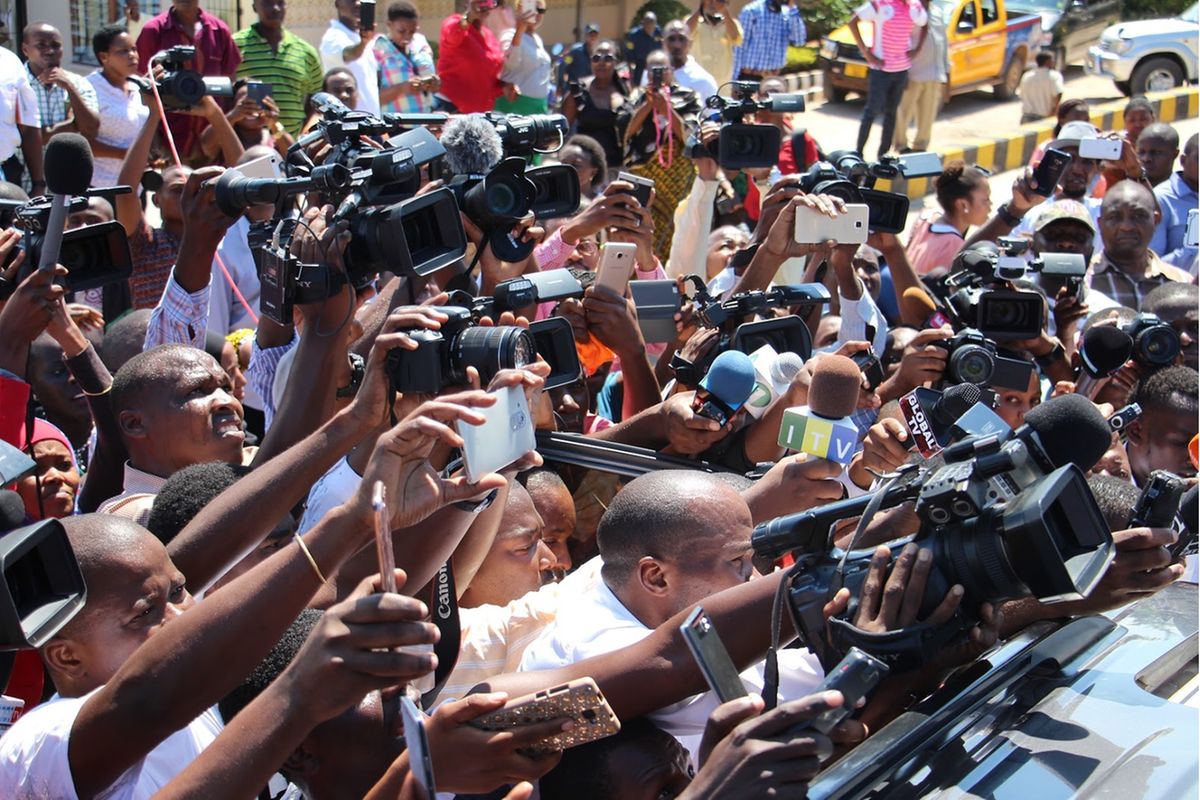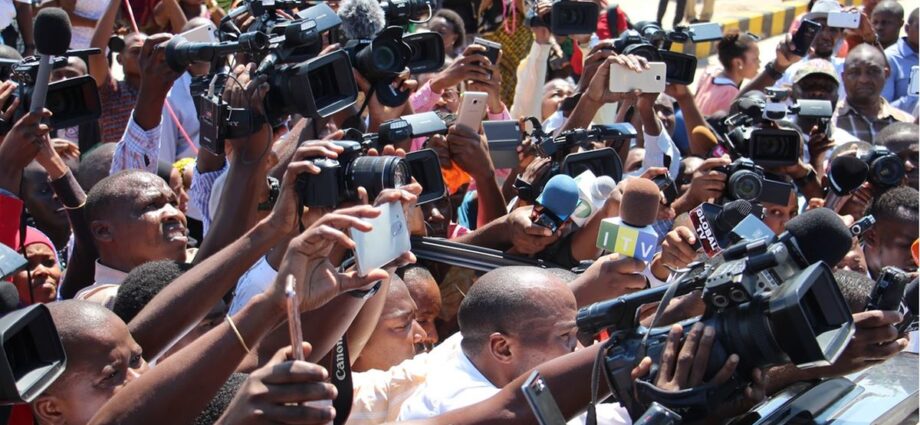
Dodoma, Tanzania.
The Parliament of Tanzania has enacted new Regulations for the year 2023, which have set penalties for journalists and conditions on how to take pictures inside the Parliament hall.
The regulations which have been published in the Government Gazette (GN) of March 21, 2023 have explained the areas where photography is allowed and the cameras that will be used will have to be approved by the secretary of Parliament.
The regulations have been signed by the Secretary of the Parliament of Tanzania, Nenelwa Mwihambi, on February 7, 2023.
In addition to that, reporters have been assigned a way to report the news of the Parliament where the rules mention things that will not be allowed to be reported are private ones.
The regulations state that these issues are those whose information, if disclosed to journalists ahead of time, may affect the committee’s decision and also lead to a violation of the rules of Parliament.
These issues are all the work that is sent to the Committee and the Speaker to get recommendations for actions to be taken by the Parliament and all the analysis activities of the various points before the committee.
Others are all activities carried out in an investigative procedure, all investigative activities with a stipulated procedure carried out by the committee and all activities carried out by sub-committees and committees when they conduct investigative visits.
The rules have mentioned the committees that carry out duties in private are the Leadership Committee, the Parliamentary Rules Committee, the Rights, Ethics and Powers Committee of the Parliament, the Foreign Affairs, Defense and Security Committee, the Public Accounts Committee (PAC), the Local Government Account (LAAC) and Budget Committee.
Also, it says that information with limited transparency that is the information of the Comptroller and Auditor General of Government Accounts (CAG) when it is presented to the parliament becomes public to the media.
Another information is the process of these committees to question the responsible officers in relation to the CAG report will be open until the point where the Committee wants to make a decision to give recommendations for actions to be taken by the Parliament, where the Committee will do its work in private.
The rules have said that if the process of questioning the responsible officers will be investigative, the process will be done in private.
Regarding photography, the regulations have stated that photography in the Parliament hall and Parliament areas will focus on respect, dignity and dignity.
He also said that the equipment to be used in photography will be approved by the Secretary before taking photos in the Parliament hall and Parliament areas.
“When the photographer is in the Parliament hall, he will point his camera at the Speaker or Member of Parliament who is speaking at that time,” said the rules.
Also, the photographer can stop pointing the camera at the Speaker or Member of Parliament and point to another place where there is another event related to the ongoing activity.
In addition, the regulations have mentioned the places where taking pictures is not allowed are the security inspection areas, banks, restaurants, the Parliament clinic, car parks, all guest lounges and the administration building and others to be decided by the Secretary.
However, photography in those areas may be allowed with a permit issued by the Secretary.
The regulations state that a media outlet or a person who violates this guideline may be subject to warning measures and may be temporarily suspended from receiving and providing information about the Parliament.
They have also explained that another step is the cancellation of the permit for the collection of information and the release of information from the Parliament.
In addition, the regulations have said that a person or a media outlet that violates the terms of the guidelines will have the opportunity to be heard by the secretary before action is taken.
Due to these regulations, the Chairman of the Tanzania Reciters’ Forum (TEF), Deodatus Balile said, “we have heard, we will analyze them, we will contact the leadership of the Parliament and why we want to push back the freedom of information.”
And the Chairman of the Dodoma Journalists’ Club (CPC), Mussa Yusuph said he was shocked by those regulations due to the fact that the government of President Samia Suluhu Hassan has distinguished itself in expanding the scope of democratic issues and freedom of expression.
He said that President Samia was able to open the closed media, reduce registration fees in social networks, but at the same time there are other institutions coming up with attitudes that are believed to be reversing President Samia’s efforts.
“My opinion is that the rules should be reviewed and if there was a perception that led to the coming of those rules, they can open a discussion table and on our side (journalists) we came up with rules that will be friendly,” he said.
He said friendly rules will enable the people to be well informed about what is going on in parliament because that body is their property.
Source: tanzania24news.com
Share this news
This Year’s Most Read News Stories

Zanzibar airport operators decry job losses over Dubai deal
Tanzania air operators say over 600 workers are set to lose their jobs after the semi-autonomous government of Zanzibar awarded a Dubai-based company exclusive rights to handle ground services at a refurbished airport.
The Tanzania Air Operators Association (Taoa) said in a statement that the contract awarded to Dnata, which is registered at the London Stock Exchange, was in breach of the law banning any company from having exclusive rights to ground-handling services at major airports.Continue Reading

Tanzania Declares End of Marburg Virus Disease Outbreak

Tanzania today declared the end of Marburg virus disease outbreak after recording no new cases over 42 days since the death of the last confirmed case on 28 January 2025.
The outbreak, in which two confirmed and eight probable cases were recorded (all deceased), was the second the country has experienced. Both this outbreak, which was declared on 20 January 2025, and the one in 2023 occurred in the north-eastern Kagera region.
In response to the latest outbreak, Tanzania’s health authorities set up coordination and response systems, with support from World Health Organization (WHO) and partners, at the national and regional levels and reinforced control measures to swiftly detect cases, enhance clinical care, infection prevention as well as strengthen collaboration with communities to raise awareness and help curb further spread of the virus.
Growing expertise in public health emergency response in the African region has been crucial in mounting effective outbreak control measures. Drawing on experience from the response to the 2023 Marburg virus disease outbreak, WHO worked closely with Tanzanian health authorities to rapidly scale up key measures such as disease surveillance and trained more than 1000 frontline health workers in contact tracing, clinical care and public health risk communication. The Organization also delivered over five tonnes of essential medical supplies and equipment.
“The dedication of frontline health workers and the efforts of the national authorities and our partners have paid off,” said Dr Charles Sagoe-Moses, WHO Representative in Tanzania. “While the outbreak has been declared over, we remain vigilant to respond swiftly if any cases are detected and are supporting ongoing efforts to provide psychosocial care to families affected by the outbreak.”
Building on the momentum during the acute phase of the outbreak response, measures have been put in place to reinforce the capacity of local health facilities to respond to potential future outbreaks. WHO and partners are procuring additional laboratory supplies and other equipment for disease detection and surveillance and other critical services.
Marburg virus disease is highly virulent and causes haemorrhagic fever. It belongs to the same family as the virus that causes Ebola virus disease. Illness caused by Marburg virus begins abruptly. Patients present with high fever, severe headache and severe malaise. They may develop severe haemorrhagic symptoms within seven days.
In the African region, previous outbreaks and sporadic cases have been reported in Angola, the Democratic Republic of the Congo, Ghana, Kenya, Equatorial Guinea, Rwanda, South Africa and Uganda.
Source: allafrica.com

Tato faults Zanzibar mandatory insurance for arriving visitors
Tato chairman has dismissed the new policy is an unnecessary and duplicative burden on touristsContinue Reading










